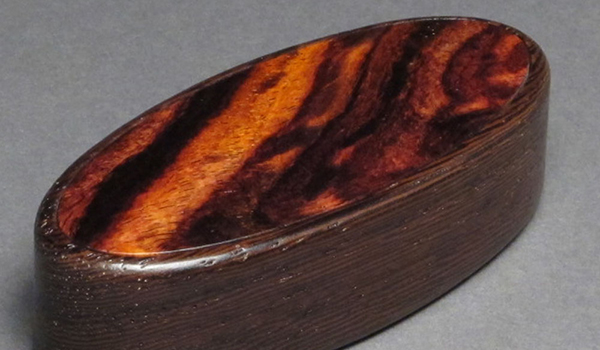
Eugene Watson’s boxes and pieces of furniture are recognized nationally as much for their sculptural qualities as for the woodworking skill that goes into them. Deciding to channel his creativity into wood required a significant career change and eventually a move half across the country for Eugene. That’s because, before he became a woodworker, Eugene Watson liked electronics. Throughout high school and college that was his primary interest, and after college he went into electronics design. As part of a large organization, however, the length of time and red tape required to get from an idea to implementation was frustrating. Feeling burnt out, he took up a hobby that would give him quicker results and personal satisfaction.
“I just started working with wood and making furniture.” Eugene explained, “It gets quick results, and I can work with my hands, which is something I’ve always wanted to do. I started by making speaker cabinets, and that was kind of the transition because I would design the electronics for inside. Later that evolved into a couple of desks, cedar chests and other basic box shapes.”
He didn’t have a lot of prior experience or even interest in woodworking, so Eugene attended seminars, went to any class he could find, read books and magazines, and little by little he learned. Then people started buying his pieces, and Eugene realized he was the kind of person who liked working for himself.
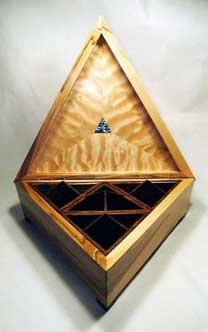
“When you do it for a living, it doesn’t take too long when you are working 50 hours a week before you start getting good at it. So in 1990, I quit my job and started woodworking fulltime.”
Watson Woodworks was born. Eugene and his wife, Marguerite, were living in Chicago, and he set up shop in an old loft just outside Chinatown. With his technical background, it’s not surprising that his designs were based on geometric shapes. It was a difficult challenge to work out the complex angles and curves, but he used a CAD program and drew on his trigonometry and math skills to create precise drawings of the furniture and boxes he wanted to make.
Within a few years, Eugene’s work was winning awards and national recognition. Making the rounds at Chicago-area art shows provided him with a good retail income. When his wife had a job offer in Denver, the couple moved west in 1997. It was a difficult transition.
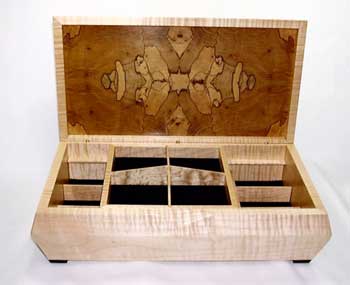
“When I came out here, I was still trying to travel as close as possible because the farther you travel the less money you make. In Colorado they wanted a more rustic look, and my work is very contemporary. All the retail I had done was east of the Mississippi, and the shows weren’t as good out here as they were around the Chicago area.”
To survive in the area, Eugene made a switch to wholesale and now sells to galleries, which he feels are much better able to market his work.
“Before I would spend about six months woodworking and the other six traveling around.” Eugene explained, ” I was already production oriented back in Chicago, just to make what I needed for the six-month time frame. But I started spending more time doing the work of woodworking.”
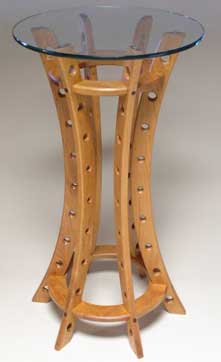
Over time, the box making has become his strongest line and the one for which he’s become best known. His boxes have been featured in several books and magazine articles.
To provide Eugene with more space, the couple recently moved to southern Colorado, west of Pueblo. Now both of them work out of their home — Marguerite is an executive recruiter and Eugene has a 1,200 square foot basement shop and land to build on if he needs to expand further.
“Now I go to a wholesale show every year out on the East Coast.” Eugene noted, “That’s where I get all of my orders. Buyers come, place their orders, and I spread them out over the year as best I can so that I have regular billings and income.”
Eugene has a web site that displays his work, but no prices are provided and it’s not really intended as a means of selling his work.
“95% of my work is sold wholesale to galleries, and they don’t want me to sell on the Internet and compete with them. And besides, I think my work needs to be seen and touched to appreciate the quality and the price.”
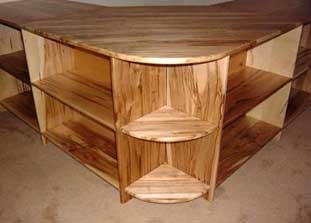
In the future, Eugene hopes to do more high-end furniture pieces and get back into exhibitions. In the meantime, he loves what he’s doing.
“I work for myself and don’t have to report to anyone. I like working with all the different woods. It’s easy to get up each day and do this!”





